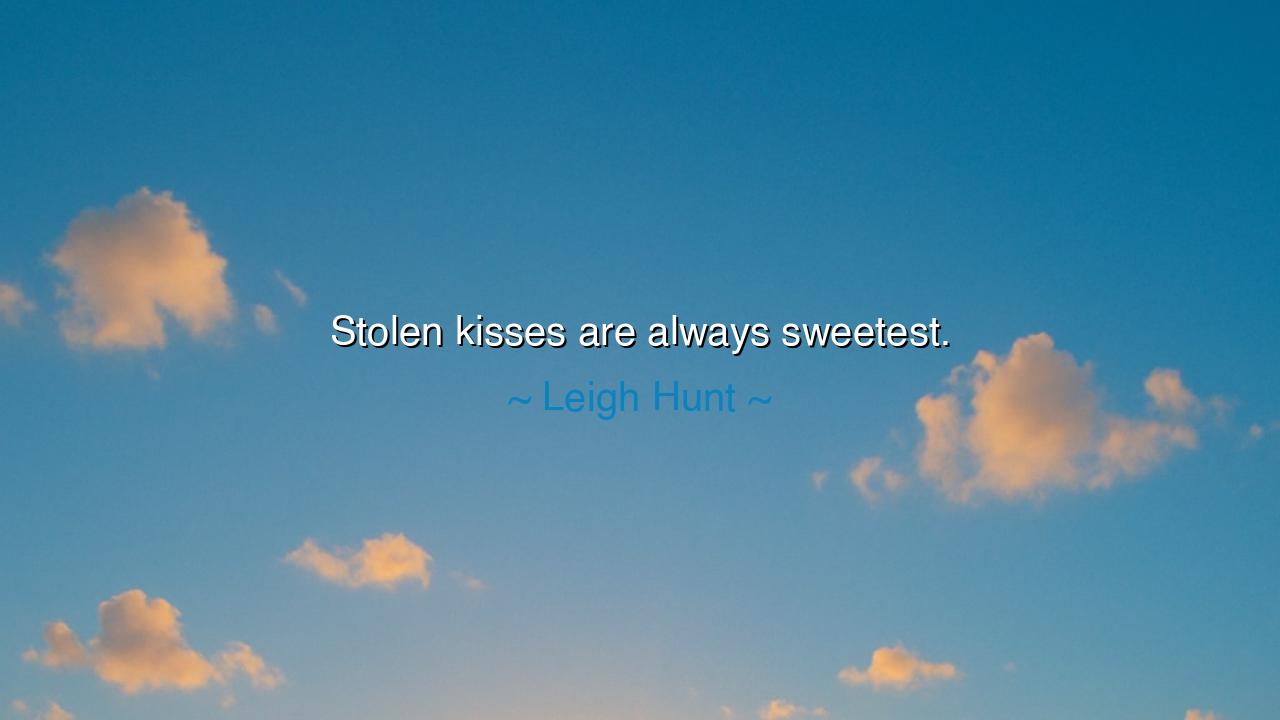
Stolen kisses are always sweetest.






“Stolen kisses are always sweetest.” – Leigh Hunt
So speaks Leigh Hunt, the English poet whose heart pulsed with both tenderness and mischief, who understood that human love is woven of both innocence and daring. In this line, he captures a truth that has echoed through the ages — that forbidden joys often burn the brightest. To say “stolen kisses are always sweetest” is to confess that love’s thrill often grows in the shadow of secrecy, that the heart is stirred most deeply not only by affection, but by the risk that accompanies it. For what is forbidden tempts the soul; and what is rare awakens its longing.
This idea, though clothed in romance, reaches beyond mere flirtation. It speaks to the nature of human desire, to the way the soul yearns more fiercely for what it cannot easily possess. The ancients called this eros, the divine fire that drives creation and ruin alike. A “stolen kiss” is not simply an act of passion — it is a moment where fear and longing meet, where the sweetness of affection is heightened by the trembling of danger. Hunt, like the poets before him, understood that the thrill of love is sharpened by its mystery, and that beauty, when chased, often glows brighter than when held.
But there is another layer — deeper, subtler, and more human. For Hunt’s words are not only about rebellion, but about awakening. The “stolen kiss” represents the spark that reminds the heart it is alive. In lives bound by routine, love’s sudden boldness — whether in a whispered confession, a secret glance, or a quiet act of courage — breaks the monotony of existence. It is the reminder that joy cannot be tamed, that passion cannot be legislated. The sweetness lies not merely in secrecy, but in the realization that love, in its truest form, always defies convention.
Consider the story of Abelard and Héloïse, two souls from medieval France whose forbidden love defied the rigid walls of church and society. Their union was secret, their affection hidden behind letters and stolen moments. Though tragedy befell them — separation, suffering, silence — their love endured in spirit, immortalized in their writings. Each letter burned with the ache of desire unfulfilled, yet purified by devotion. Their kisses, stolen beneath the shadow of condemnation, were not merely sweet because they were secret, but because they revealed the depths to which love can move a human soul — to risk all for the sake of one tender truth.
Yet Hunt’s words are also a caution, cloaked in charm. For the sweetness of the “stolen” often fades when brought into the light. The thrill of the forbidden can blind us to the deeper essence of love — that it is not sustained by secrecy, but by sincerity. The ancients taught that passion may ignite quickly, but only virtue keeps the flame. The “stolen kiss” delights the senses, but lasting love nourishes the spirit. Thus, one must not chase sweetness alone, but seek the goodness beneath it — the kind that endures after the fire cools.
Still, we cannot deny that there is something sacred in those fleeting moments of bold affection — those times when love dares, when it risks, when it breaks its own boundaries. Even the gods of myth understood this. Zeus himself, though divine, fell to the power of forbidden desire; Cleopatra and Antony, though rulers of nations, bowed before its call. These tales, whether tragic or glorious, remind us that to love is to live on the edge of risk, and that even a single kiss — when taken from the hands of fate — can taste like eternity.
So, my listener, when you hear the words “stolen kisses are always sweetest,” do not read them as a call to reckless desire, but as a hymn to the heart’s vitality. Let them remind you that love must contain wonder, courage, and a hint of the untamed. Cherish the thrill, but honor the truth. Seek not to steal love, but to earn it in such a way that every kiss — open or hidden — feels as sacred as the first. For the sweetness of love does not truly come from secrecy, but from the courage to feel deeply, to risk wholly, and to live as though the heart itself were a divine flame that refuses to go cold.






AAdministratorAdministrator
Welcome, honored guests. Please leave a comment, we will respond soon